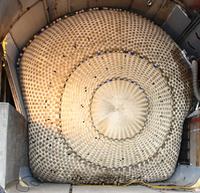-
Containing a tunnel flood with an inflatable giant plug

Researchers have developed a giant plug to contain tunnel floods; the plug inflates (with water or air) to dimensions of roughly 32-feet-long and by 16-feet-wide, and holds 35,000 gallons, about the same capacity as a medium-sized backyard swimming pool
-
-
New laws help cut metal thefts

Metal thefts have become a plague to businesses throughout the country; some states pass laws which require licenses and permits to buy and sell non-ferrous metals; Spartanburg, South Carolina, also requires that buyers pay for the purchases with checks rather than cash, in order to create a paper trail to the seller of the metal
-
-
A swarm of small satellites to deflect menacing asteroids
New research suggests that the best way to divert an asteroid hurtling toward Earth is using a swarm of relatively small satellites flying in formation and cooperatively firing solar-powered lasers onto an asteroid; this would be a more effective way than the current methods being contemplated, which are focused on large unwieldy spacecraft
-
-
1930s technology to become 21st century tool against CO2 emissions
Human activity releases 30 billion tons of carbon dioxide into the air each year; a new approach to dealing with the problem has a back-to-the-future glint, leveraging technology that the petroleum industry has used since the 1930s to remove carbon dioxide and other impurities from natural gas
-
-
Dueling legislation over cybersecurity regulations
Attacks on U.S. critical infrastructure may bring about a Katrina-like situation: no electricity, no fresh water, limited traffic control, severely curtailed emergency response, and more; about 85 percent of U.S. critical infrastructure is privately owned; two different cybersecurity bills in Congress envision different solutions to U.S. infrastructure’s cyber vulnerability
-
-
Confirmed: oil from Deepwater Horizon disaster entered food chain
For months, crude oil gushed into the water at a rate of approximately 53,000 barrels per day; new study confirms that not only did oil affect the ecosystem in the Gulf during the blowout, but it was still entering the food web after the well was capped
-
-
Asteroid to miss Earth next year, but not by much

When it whizzes past Earth in 2013, a newly discovered asteroid is going to miss our planet — but not by much; the 50-meter space rock is expected to come closer than many satellites, highlighting the growing need to keep watch on hazards from above
-
-
NICB warns of growing copper thefts
A recently released report by the National Insurance Crime Bureau (NICB) concludes that copper and other metal thefts are on the rise once again in the United States
-
-
U.S. files trade charges against China over rare minerals

China mines and sells about 97 percent of the world’s rare Earth elements – seventeen metals used in cell phones, advanced batteries, wind turbines, and more; the Chinese, in violation of WTO rules, have manipulated the export of these minerals in order to weaken the techno logy sectors of other countries, and punish countries over political disputes
-
-
Millions of Americans at risk of flooding as sea levels rise
Nearly four million Americans, residing in a combined area larger than the state of Maryland, find themselves at risk of severe flooding as sea levels rise in the coming century, new research suggests; in terms of population, Florida is the most vulnerable, closely followed by Louisiana, California, New York, and New Jersey
-
-
iPads allow judges to sign warrants anywhere
Getting local judges to sign last minute warrants just got a lot easier with iPads
-
-
PG&E pays additional $70 million for San Bruno natural gas explosion
On Monday, Pacific Gas & Electric Co. (PG&E) announced that it will pay $70 million to residents of San Bruno, California after one of the utility’s natural gas pipelines erupted killing eight people and destroying nearly forty homes
-
-
Innovative CCTV protects copper cables
The theft of copper cables has cost the British economy an estimated £770 million a year over the last few years; British company which rely on copper cables to deliver their services are deploying an innovative CCTV to combat the thieves
-
-
NYC cyberattack simulation to spur Senate cybersecurity legislation

Last Wednesday, in an attempt to bolster support for cybersecurity legislation, the White House staged a mock cyberattack on New York City’s power supply for the Senate
-
-
Shift to green energy could mean crunch in rare Earth metals supply
A large-scale shift from coal-fired electric power plants and gasoline-fueled cars to wind turbines and electric vehicles could increase demand for two already-scarce metals — available almost exclusively in China — by 600-2,600 percent over the next twenty-five years
-
- All
- Regional
- Water
- Biometrics
- Borders/Immig
- Business
- Cybersecurity
- Detection
- Disasters
- Government
- Infrastructure
- International
- Public health
- Public Safety
- Communication interoperabillity
- Emergency services
- Emergency medical services
- Fire
- First response
- IEDs
- Law Enforcement
- Law Enforcement Technology
- Military technology
- Nonlethal weapons
- Nuclear weapons
- Personal protection equipment
- Police
- Notification /alert systems
- Situational awareness
- Weapons systems
- Sci-Tech
- Sector Reports
- Surveillance
- Transportation
Advertising & Marketing: advertise@newswirepubs.com
Editorial: editor@newswirepubs.com
General: info@newswirepubs.com
2010-2011 © News Wire Publications, LLC News Wire Publications, LLC
220 Old Country Road | Suite 200 | Mineola | New York | 11501
Permissions and Policies
Editorial: editor@newswirepubs.com
General: info@newswirepubs.com
2010-2011 © News Wire Publications, LLC News Wire Publications, LLC
220 Old Country Road | Suite 200 | Mineola | New York | 11501
Permissions and Policies
